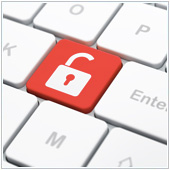 With the ever growing number of security threats faced by businesses around the world, the vast majority of business owners have adopted some form of security measures in an effort to keep their organizations secure. But, how do you know the measures you’ve implemented are actually keeping your systems safe? Here are five ways you can tell if your security measures aren’t sufficient.
With the ever growing number of security threats faced by businesses around the world, the vast majority of business owners have adopted some form of security measures in an effort to keep their organizations secure. But, how do you know the measures you’ve implemented are actually keeping your systems safe? Here are five ways you can tell if your security measures aren’t sufficient.
1. Open wireless networks
Wireless networks are one of the most common ways businesses allow their employees to get online. With one main Internet line and a couple of wireless routers, you can theoretically have the whole office online. This method of connecting does save money, but there is an inherent security risk with this and that is an unsecure network.
Contrary to popular belief, simply plugging in a wireless router and creating a basic network won’t mean you are secure. If you don’t set a password on your routers, then anyone within range can connect. Hackers and criminal organizations are known to look for, and then target these networks. With fairly simple tools and a bit of know-how, they can start capturing data that goes in and out of the network, and even attacking the network and computers attached. In other words, unprotected networks are basically open invitations to hackers.
Therefore, you should take steps to ensure that all wireless networks in the office are secured with passwords that are not easy to guess. For example, many Internet Service Providers who install hardware when setting up networks will often just use the company’s main phone number as the password to the router. This is too easy to work out, so changing to a password that is a lot more difficult to guess is makes sense.
2. Email is not secure
Admittedly, most companies who have implemented a new email system in the past couple of years will likely be fairly secure. This is especially true if they use cloud-based options, or well-known email systems like Exchange which offer enhanced security and scanning, while using modern email transition methods.
The businesses at risk are those using older systems like POP, or systems that don’t encrypt passwords (what are known as ‘clear passwords’). If your system doesn’t encrypt information like this, anyone with the right tools and a bit of knowledge can capture login information and potentially compromise your systems and data.
If you are using older email systems, it is advisable to upgrade to newer ones, especially if they don’t encrypt important information.
3. Mobile devices that aren’t secure enough
Mobile devices, like tablets and smartphones, are being used more than ever before in business, and do offer a great way to stay connected and productive while out of the office. The issue with this however is that if you use your tablet or phone to connect to office systems, and don’t have security measures in place, you could find networks compromised.
For example, if you have linked your work email to your tablet, but don’t have a screen lock enabled and you lose your device anyone who picks it up will have access to your email and potentially sensitive information.
The same goes if you accidentally install a fake app with malware on it. You could find your systems infected. Therefore, you should take steps to ensure that your device is locked with at least a passcode, and you have anti-virus and malware scanners installed and running on a regular basis.
4. Anti-virus scanners that aren’t maintained
These days, it is essential that you have anti-virus, malware, and spyware scanners installed on all machines and devices in your company and that you take the time to configure these properly. It could be that scans are scheduled during business hours, or they just aren’t updated. If you install these solutions onto your systems, and they start to scan during work time, most employees will just turn the scanner off thus leaving systems wide-open.
The same goes for not properly ensuring that these systems are updated. Updates are important for scanners, because they implement new virus databases that contain newly discovered malware and viruses, and fixes for them.
Therefore, scanners need to be properly installed and maintained if they are going to even stand a chance of keeping systems secure.
5. Lack of firewalls
A firewall is a networking security tool that can be configured to block certain types of network access and data from leaving the network or being accessed from outside of the network. A properly configured firewall is necessary for network security, and while many modems include this, it’s often not robust enough for business use.
What you need instead is a firewall that covers the whole network at the point where data enters and exits (usually before the routers). These are business-centric tools that should be installed by an IT partner like us, in order for them to be most effective.
How do I ensure proper business security?
The absolute best way a business can ensure that their systems and networks are secure is to work with an IT partner like us. Our managed services can help ensure that you have proper security measures in place and the systems are set up and managed properly. Tech peace of mind means the focus can be on creating a successful company instead. Contact us today to learn more.